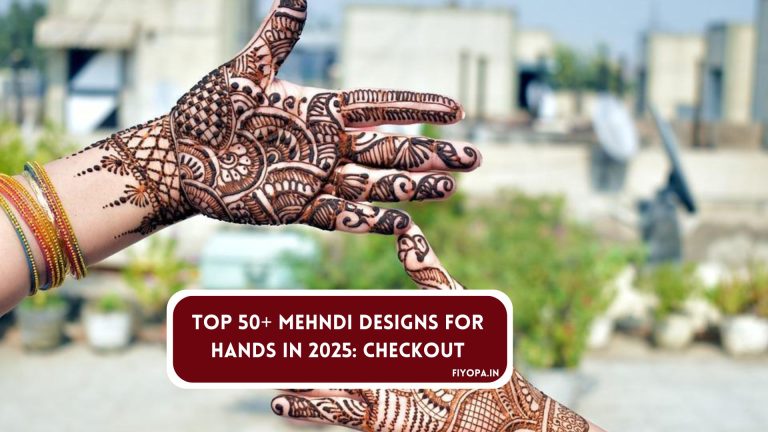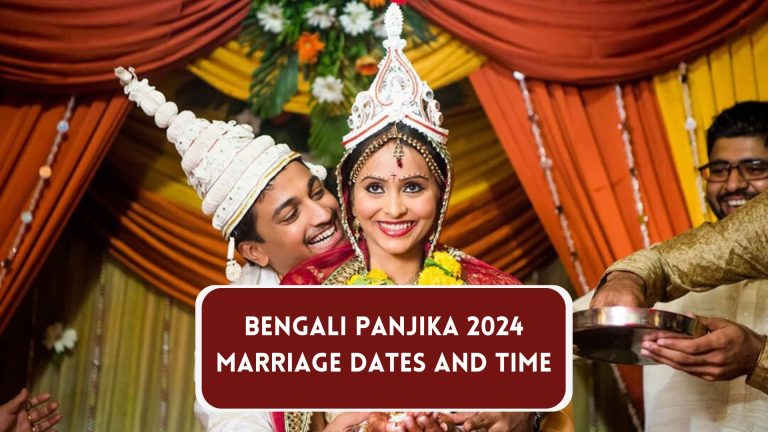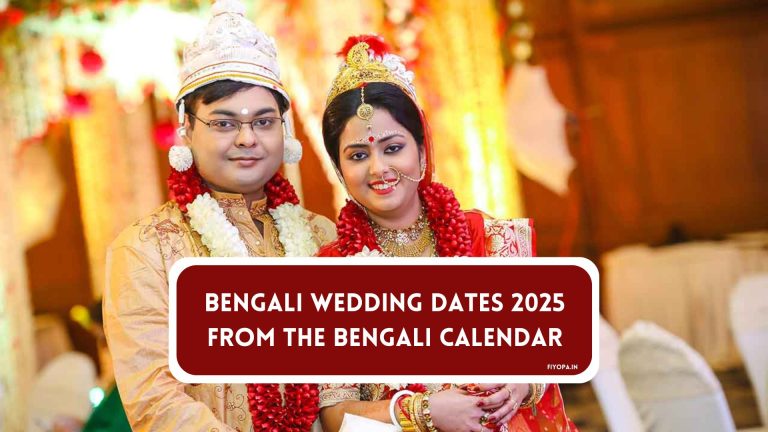Bengali Marriage Rituals Step By Step | Checkout
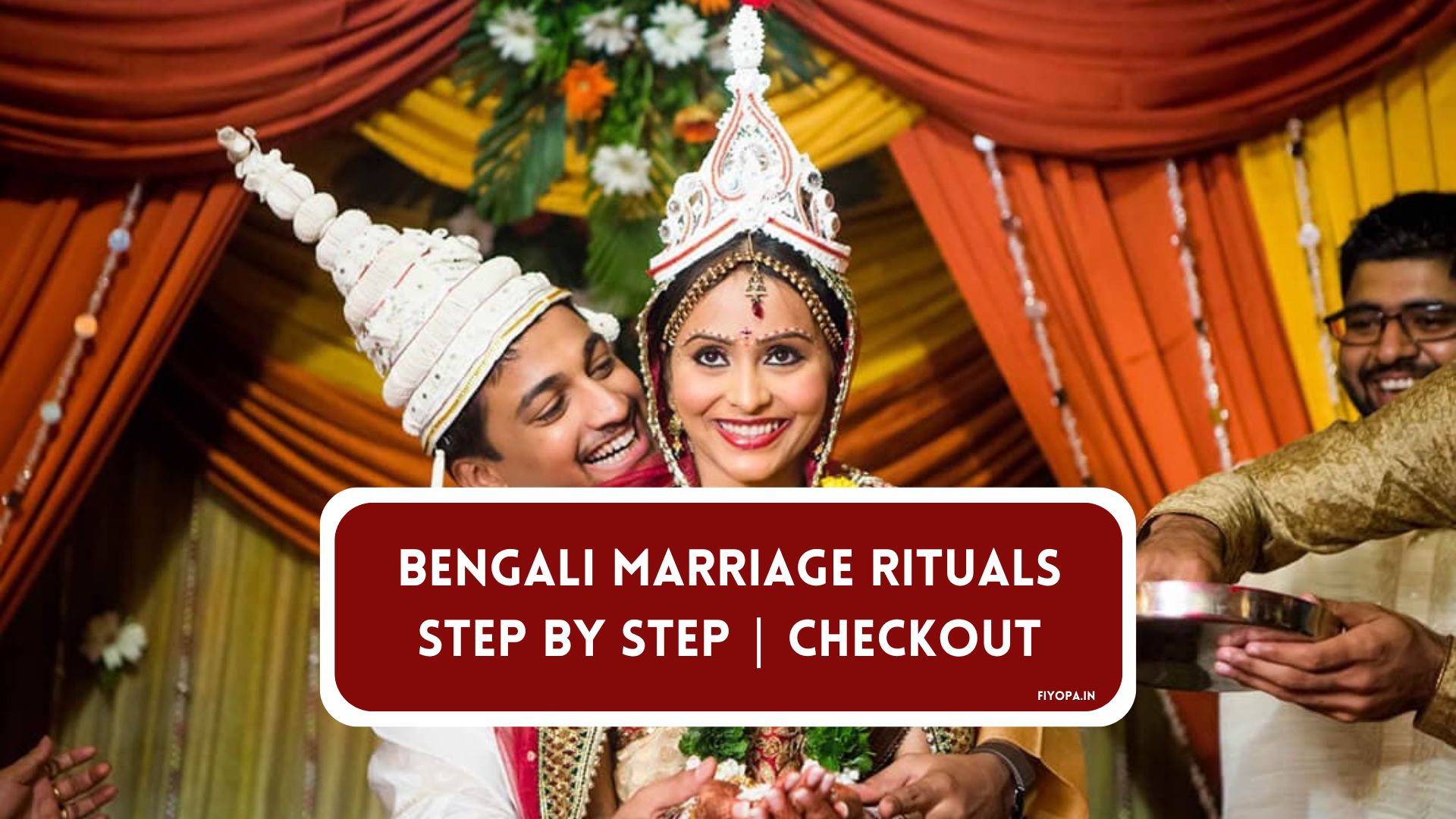
Bengali Marriage Rituals Step By Step in rich cultural heritage and vibrant traditions. These ceremonies have been passed down through generations, creating a beautiful union between two individuals. From pre-wedding rituals to post-wedding celebrations, each step holds significance symbolizing love and commitment. Let’s explore the Bengali marriage rituals with reverence.
Traditional Bengali Wedding
Traditional Bengali weddings are colorful celebrations filled with customs, rituals, prayers, and festivities lasting several days. It involves elaborate preparations starting weeks or months ahead of the wedding. Below are some essential components of traditional Bengali weddings:
- Mandap: Located near the wedding venue, mandaps are temporary structures decorated elaborately with flowers, lights, and intricate designs. Couples exchange vows beneath a sacred tree planted inside the mandap surrounded by family members and friends.
- Baraat/Barat Procession: On the wedding day, the groom arrives at the bride’s house accompanied by his family and friends riding horses adorned with bells and decorative cloths. Bride’s family welcomes them warmly with songs, dance performances, sweets, and prayers.
- Kanyadaan: Father of the bride hands over his daughter’s hand to the groom symbolizing her consent to marry him. Alongside, the maternal uncle performs the ritual named Ghatta Bandhan or Kal Saajani, tying five coins and rice grains between the bride and groom’s wrists for prosperity.
- Panthi/Saptapadi: The couple walks seven steps together around the sacred fire symbolizing commitment and unity. During these steps, the father gives blessings and presents gifts to the couple.
- Sindoor & Mangalsutra: The Groom applies vermilion (sindoor) on the bride’s forehead marking her married status, and ties the mangalsutra around her neck. Friends and relatives shower flowers and blessings upon the newlyweds.
- Reception: After exchanging wedding vows and completing ceremonies, both families host a grand feast celebrating joyously with dance performances, speeches, games, and musical entertainment.
These traditions reflect ancient Indian cultural practices blended with regional influences and continue evolving gradually. Bengali weddings maintain a sense of traditionality yet celebrate modern aspects, reflecting the diverse culture and rich heritage of the Bengal region.
Pre-Wedding Rituals in Bengali Marriage
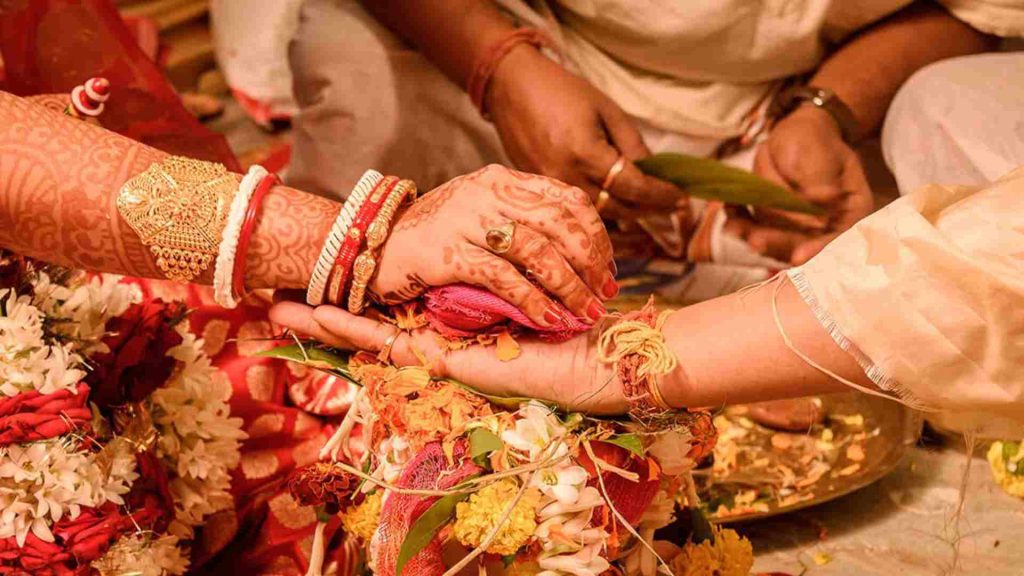
Pre-wedding rituals in Bengali marriages follow strict traditions dating back centuries but have evolved slightly with changing times. Here are some crucial pre-wedding rituals observed before the wedding ceremony takes place:
- Borsha Puja: Performed at least a month before the wedding, borsha puja involves praying to Lord Shiva asking for blessings to bless the prospective bride and groom’s relationship. An image of Lord Shiva is worshiped along with offerings consisting of fruits, flowers, incense sticks, and sweets.
- Baghbandi/Bride’s Foot Tying: Close female relatives tie threads around the bride’s feet as a protective measure against evil forces. This custom reflects the belief that Goddess Lakshmi resides in women’s feet, thus safeguarding the bride.
- Mehendi/Henna Application: Henna paste is applied on the hands and feet of the bride two days before marriage as a part of the pre-marriage ritual known as mehndi lagao. Brides wear vibrant-colored henna designs showcasing traditional patterns.
- Sonabashi: Silver jewelry items including rings, necklaces, earrings, bangles, etc., are bought for the bride by the groom’s side. This purchase reflects the commitment made by the groom towards supporting and caring for the bride forever.
- Jatnamanushti/Daughter Welcoming: Parents invite their relatives and neighbors to a celebration organized specifically for welcoming their daughters to their homes as brides. Familial bond strengthens through food, music, dance performances, and gift exchanges.
- Lagna Patrika Exchange: Future bride and groom’s families exchange wedding invitation letters called lagna patrika containing essential wedding dates, venues, and timelines.
These rituals highlight the importance placed on spiritual beliefs and familial bonds in Bengali marriages. They instill a feeling of joy and excitement in the families involved and add depth to the overall wedding experience.
Wedding Day Rituals in Bengali Marriage
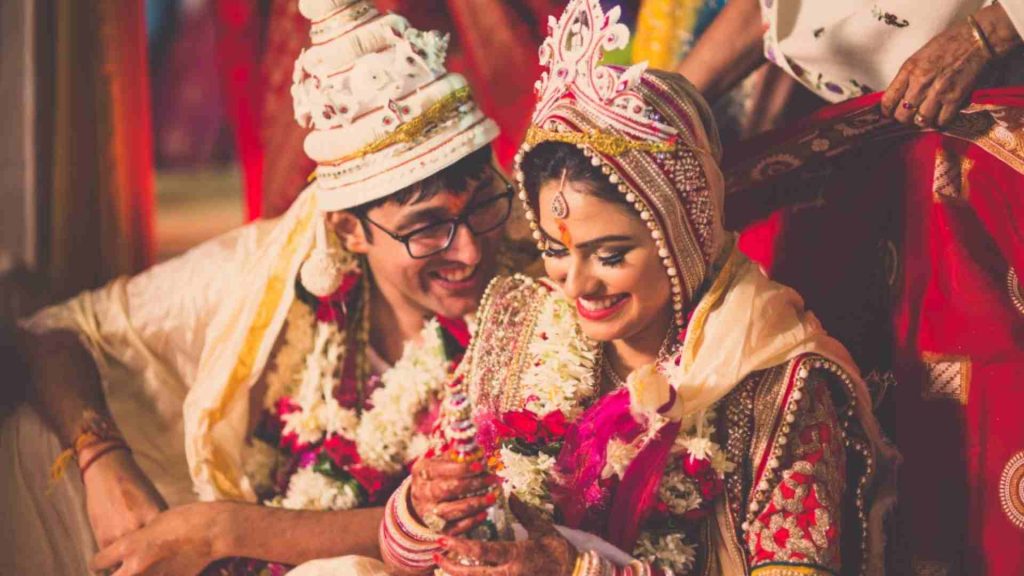
Day wedding rituals consist of multiple ceremonies performed sequentially according to Hindu Astrology predictions. Here are some significant rituals conducted on the wedding day in Bengali marriages:
- Mangala Stana: The mother of the bride performs a ritual bath called ‘Mangala Snana,’ cleansing the bride mentally and physically for her upcoming marital journey. She prays to Goddess Parvati, seeking blessings for a happy married life.
- Conjunction Puja: Performed after applying henna designs on the bride’s hands and feet, conjunction puja marks the formal acceptance of the marriage proposal by both families. Prayers are offered to gods and goddesses, seeking their blessing for the union.
- Sindoor Daan/Application: As per Hindu customs, the husband applies vermilion powder called sindoor on the wife’s forehead post-marriage ceremonies. This symbolizes the wife accepting her husband as her lord and protector.
- Seven Vows Exchange: Husband reads aloud seven vows symbolizing a lifelong commitment to wife. The wife repeats these vows affirming her loyalty and devotion to her husband. Together, they promise each other to respect, support, and care for each other unconditionally throughout their lives.
- Mangalya Bandhan: The husband ties the holy thread, called Mangalsutra, around the wife’s neck symbolizing eternal protection and well wishes. This step concludes the marriage ceremonies officially.
- Vidaai/Farewell: After completion of all wedding rituals, the bride leaves her parental home for her husband’s residence with teary farewells. Friends and relatives bid goodbye, showering blessings for a prosperous married life.
Throughout the wedding day, Bengali rituals emphasize collective involvement, happiness, and positivity among all attendees. Each ritual carries a deep meaning reinforcing the sanctity of marriage in Hindu culture.
Post-Wedding Rituals in Bengali Marriage
Post-wedding rituals in Bengali marriages usually begin about four days after the wedding ceremonies conclude. Here are some prominent Bengali post-wedding rituals practiced:
- Griha Pravesh: The couple enters their new home following a ceremonial entrance with auspicious steps. Family elders bless the couple and offer advice for a successful married life.
- Haldi/Haldhumi: A special ritual where yellow turmeric paste mixed with oil is applied on both sides of the bride and groom’s faces. This symbolizes purity and removes evil eyes and negativity.
- Chaar Phera/Ceremony of Four Circuits: The couple visits four corners of the temple hall or marquee representing earth, sky, water, and fire elements symbolically witnessing the four directions witnesses vowing eternal companionship.
- Pantha/Saptapadi: Couple renews the vows exchanged previously amid singing hymns, prayers, and blessings by family members and friends.
- Biroshon/First Menstruation Celebration: The family celebrates a girl child reaching puberty traditionally marked by feeding her delicacies served under the shade of banana trees. Friends and relatives visit to wish for a happy married life.
- Srikhand/Sweet Cream Distribution: The Host serves guests and relatives sweet cream or puddings distributed amongst them symbolizing hospitality, joy, and abundance.
These rituals mark significant milestones in the couple’s life, strengthening relationships and creating memories to cherish for years to come. Additionally, post-wedding rituals ensure a smooth transition into the new phase of married life blessed by ancestral guidance and divine blessings.
Popular Wedding Dates in Bengali Marriage
The publicly available data provides a list of auspicious Bengali marriage dates in 2024, as per the Bengali calendar. Some of the popular wedding dates in Bengali marriage in 2024 include:
- 12 November 2024
- 13 November 2024
- 16 November 2024
- 17 November 2024
- 18 November 2024
These dates are considered auspicious for Bengali weddings, and the article also mentions that the Bengali New Year can be commenced on any of these dates. Additionally, the article discusses the significance of “Kaal Ratri” in Bengali weddings and provides information about the auspicious dates in January, February, and March.
Best Wedding Venues in Bengal
There are many beautiful and elegant wedding venues in Bengal, catering to different preferences and budgets. Choosing the perfect wedding venue depends on factors such as location, ambiance, guest capacity, budget constraints, and availability. Here are some famous and highly recommended wedding venues in Bengal:
- ITC Rajputana, Kolkata – Combining luxury and authenticity, this hotel offers exquisite indoor and outdoor spaces ideal for large gatherings.
- Radisson Blu Hotel, Kolkata – Offering state-of-the-art facilities, contemporary aesthetics, and personalized services, it caters to discerning couples looking for opulent accommodation options.
- Santiniketan Palace Hotel, Bolpur – Set amidst serene landscapes and surrounded by greenery, this luxurious palace hotel features immaculate gardens and extravagant banquet halls.
- Novotel Kolkata Sudeshna Park, Salt Lake City – Boasting elegant rooms, versatile meeting spaces, and delicious culinary offerings, this hotel ensures every aspect of your wedding celebration goes seamlessly.
- Amrapali Garden Resort, Bankura – With stunning natural beauty surrounding the property, this resort offers rustic charm combined with luxurious amenities making it an excellent choice for countryside weddings.
- Falak Mandir, Barrackpore – Ideal for intimate weddings and receptions, this elegantly designed palace boasts intricate architecture, beautiful courtyards, and top-notch services.
There are many more wedding venues scattered across Bengal offering unparalleled experiences tailored to suit individual tastes and requirements. Ultimately, selecting the right venue boils down to personal preference and the specific needs of your big day.
Tips For Bengali Marriage
Here are some tips for organising a Bengali wedding:
- Budget Planning: Determine how much you’re willing to spend on your wedding and divide it equally for various expenses like venue booking, catering, decoration, invitations, wedding dresses, and so on.
- Venue Selection: Select a venue that aligns with your budget while providing ample space for your guests comfortably without compromising the quality of service provided. Consider accessibility to your guests too.
- Wedding Date and Timeline: Consult astrologers to determine suitable dates based on religious traditions. Plan out your timeline from engagement announcements to final reception details keeping enough time to prepare everything.
- Invitations: Create unique and attractive wedding invitations that showcase your personality and convey necessary wedding information. Traditionally, Bengali wedding cards feature detailed illustrations depicting scenes from Hindu mythology.
- Decorations: Opt for traditional Bengali décor elements like potted plants, garlands made up of fresh flowers, and beautifully crafted artifacts instead of excessive lighting and noise systems.
- Food Arrangement: Choose authentic Bengali dishes prepared by professional chefs experienced in traditional cooking methods ensuring high hygiene standards.
- Wedding Attire: Ensure everyone wears appropriate attire adhering to Bengali wedding customs – both men and women wear dhoti or saree respectively.
- Photography and Videography: Engage professionals capable of capturing memorable moments while maintaining privacy during important ceremonies.
- Entertainment: Organize live music, dance performances, or magicians depending on what suits your taste and fits within your budget.
- Helpful Staff: Assign staff responsible for coordinating various wedding functions such as ushers, seat managers, etc., ensuring the smooth running of events.
By following these tips, you can organize a Bengali wedding successfully reflecting the cultural essence of West Bengal and leaving your guests with fond memories of the event.
Conclusion:
Bengali marriage rituals showcase a rich cultural heritage and traditions. These rituals spread over several days, symbolize the strong bond between two individuals and their families. From pre-wedding preparations to post-wedding celebrations, each ritual holds deep meaning, representing love, commitment, and unity. Bengali marriage customs celebrate not just the union of two people, but also life, culture, and the spirit of togetherness.
Related Read:- Bengali Panjika 2024 Marriage Dates and Time Checkout


